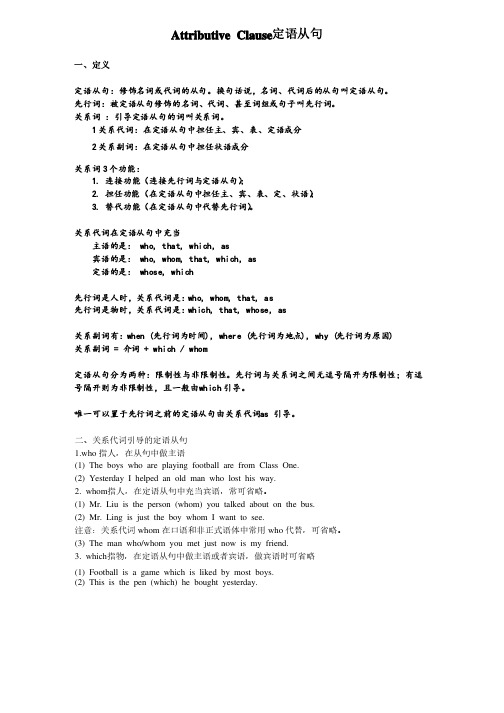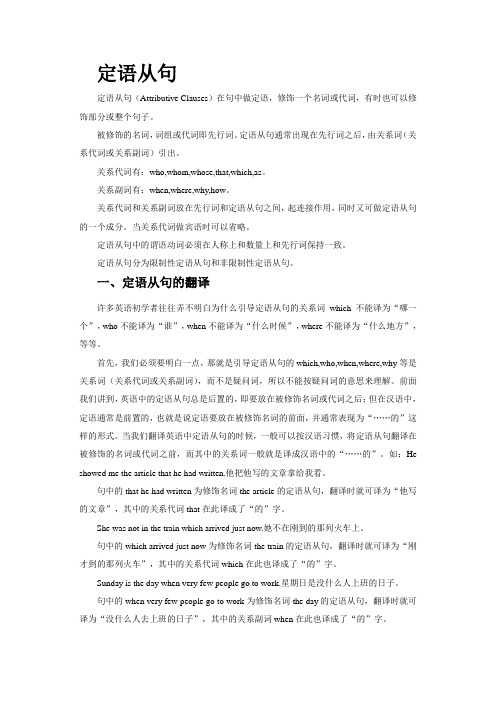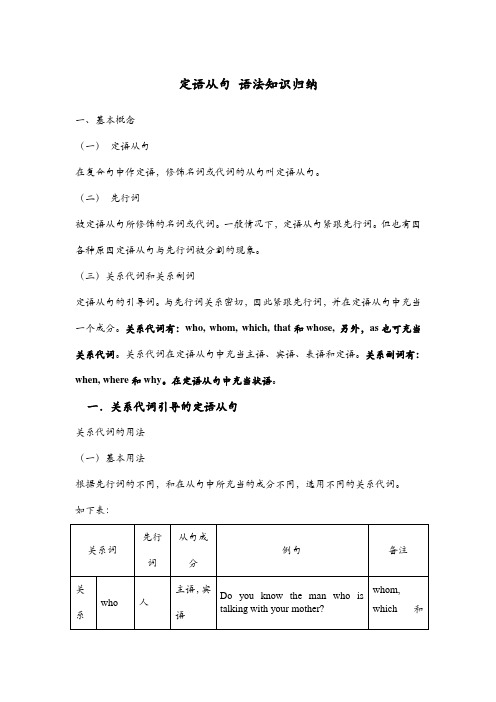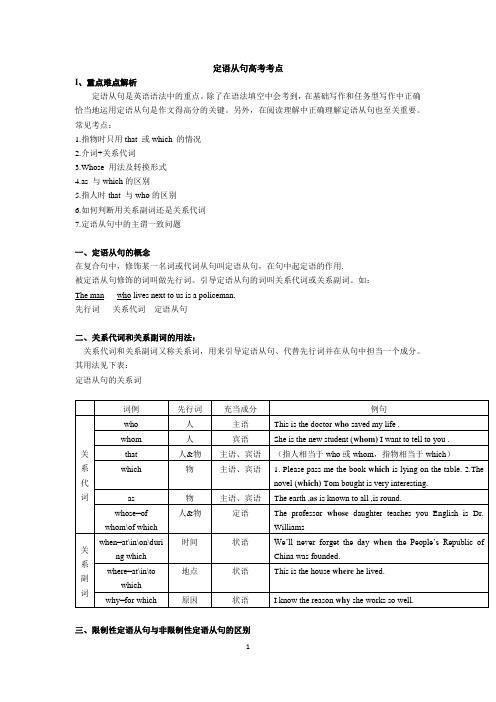定语从句
(完整版)定语从句详解+例句

Attributive Clause定语从句一、定义定语从句:修饰名词或代词的从句。
换句话说,名词、代词后的从句叫定语从句。
先行词:被定语从句修饰的名词、代词、甚至词组或句子叫先行词。
关系词:引导定语从句的词叫关系词。
1关系代词:在定语从句中担任主、宾、表、定语成分2关系副词:在定语从句中担任状语成分关系词3个功能:1. 连接功能(连接先行词与定语从句);2. 担任功能(在定语从句中担任主、宾、表、定、状语);3. 替代功能(在定语从句中代替先行词)。
关系代词在定语从句中充当主语的是: who, that, which, as宾语的是: who, whom, that, which, as定语的是: whose, which先行词是人时,关系代词是:who, whom, that, as先行词是物时,关系代词是:which, that, whose, as关系副词有:when (先行词为时间), where (先行词为地点), why (先行词为原因)关系副词 = 介词 + which / whom定语从句分为两种:限制性与非限制性。
先行词与关系词之间无逗号隔开为限制性;有逗号隔开则为非限制性,且一般由which引导。
唯一可以置于先行词之前的定语从句由关系代词as 引导。
二、关系代词引导的定语从句1.who指人,在从句中做主语(1) The boys who are playing football are from Class One.(2) Yesterday I helped an old man who lost his way.2. whom指人,在定语从句中充当宾语,常可省略。
(1) Mr. Liu is the person (whom) you talked about on the bus.(2) Mr. Ling is just the boy whom I want to see.注意:关系代词whom在口语和非正式语体中常用who代替,可省略。
(完整版)定语从句归纳

定语从句(the attributive clause )一.什么叫定语从句?一个句子作定语就叫定语从句。
二.定语从句的结构及种类1. 结构:关系词 +主语+谓语+其它2. 种类:限制性定语从句和非限制性定语从句三.关系词的分类及关系词1.关系代词: who ,whom, whose, that ,which, as2.关系副词: when ,where ,why四.关系词的功用1.起连接作用,引导定语从句2.在定语从句中作一个成分——主语,宾语,状语,定语,表语。
五.什么是先行词?被定语从句所修饰的词是先行词。
六.关系词的用法1.who当先行词是指人得名词或代词,而且关系词在句中作主语时,选who 。
The boy who is standingover there is Tom.He who doesn ’t reach the Great Wall is not a true man.2.whom当先行词是指人得名词,而且关系词在句中作主语时,选w h o m.This is our English teacher whom everybody likes.3.whose①当先行词是指人的名词,而且关系词在句中作定语时,选whose. This is my deskmate whose father works in a factory.②当先行词是指物的名词,而且关系在句中作定语时,选whose.We study in a classroom whose windows face to the south.4.that①当先行词是指物的名词,关系词在句中作主语时,选that.This is a machine that can walk.②当先行词是指物的名词,关系词在句中作宾语时,选that. 另外,that 可以省略。
I like the present (that) my father sent me.③当先行词是指人的名词,关系词也可选用that=whoThe boy that/who is playing football on the play ground is my brother.5.which当先行词是指物的名词时,关系词也可选用which ,它在句中作主语或宾语,which=that6.下列情况下,关系词只能选用that①当先行词为不定代词something, anything, nothing, everything 时Is there anything that I can do for you?②当先行词为不定代词all 时Mr. Li does all that he can to do his work well.③ 当先行词被 all, some, any 修饰时These are all the things that I have done today.④当先行词被the only, the very 修饰时This is the only computer that he often turns to for help.⑤ 当先行词被序数词,形容词最高级修饰时This is the cleaning room that you can see here.⑥time 作先行词,前面有序数词或last 修饰时This is the last time that I ’ll give y oupocket m o n e y.⑦ 尽管先行词指人,但关系词在句中作表语时。
定语从句详解(很全)

定语从句定语从句(Attributive Clauses)在句中做定语,修饰一个名词或代词,有时也可以修饰部分或整个句子。
被修饰的名词,词组或代词即先行词。
定语从句通常出现在先行词之后,由关系词(关系代词或关系副词)引出。
关系代词有:who,whom,whose,that,which,as。
关系副词有:when,where,why,how。
关系代词和关系副词放在先行词和定语从句之间,起连接作用,同时又可做定语从句的一个成分。
当关系代词做宾语时可以省略。
定语从句中的谓语动词必须在人称上和数量上和先行词保持一致。
定语从句分为限制性定语从句和非限制性定语从句。
一、定语从句的翻译许多英语初学者往往弄不明白为什么引导定语从句的关系词which不能译为“哪一个”,who不能译为“谁”,when不能译为“什么时候”,where不能译为“什么地方”,等等。
首先,我们必须要明白一点,那就是引导定语从句的which,who,when,where,why等是关系词(关系代词或关系副词),而不是疑问词,所以不能按疑问词的意思来理解。
前面我们讲到,英语中的定语从句总是后置的,即要放在被修饰名词或代词之后;但在汉语中,定语通常是前置的,也就是说定语要放在被修饰名词的前面,并通常表现为“……的”这样的形式。
当我们翻译英语中定语从句的时候,一般可以按汉语习惯,将定语从句翻译在被修饰的名词或代词之前,而其中的关系词一般就是译成汉语中的“……的”。
如:He showed me the article that he had written.他把他写的文章拿给我看。
句中的that he had written为修饰名词the article的定语从句,翻译时就可译为“他写的文章”,其中的关系代词that在此译成了“的”字。
She was not in the train which arrived just now.她不在刚到的那列火车上。
定语从句的用法

定语从句的用法一、定语从句1、定义定语从句(Attributive Clause)是一个附加于名词或代词之上的句子,它用来形容前面的名词或代词。
它的作用是限定或说明某个名词或代词所指的人或事物,是一种非常重要的句子结构。
2、关系词在定语从句中,关系词(Relative Pronoun)的作用是连接主句和定语从句,并将定语从句中的成分与主句中的某个成分联系起来。
一般而言,我们常用关系代词who, whom, whose, which和that来引出定语从句。
关系代词who 指人whom 指人whose 指人或物which 指物that 指人、物或事3、定语从句的构成(1)定语从句通常由关系代词在定语从句中引出关系,并在从句中担任某一成份的角色;(2)定语从句的谓语动词也可由一些连接词(link verb)连接,如be, feel, look, seem, smell, taste, remain,常用于定语从句中;(3)定语从句中如果省略结构,就不能用who/whom来引导定语从句;(4)定语从句中由关系副词引导而不是关系代词。
4、定语从句的用法(1)定语从句可以用来限定、修饰某个名词或代词,例如:The movie《Titanic》, which was released in1997, is still popular today.(《泰坦尼克号》,1997年上映,至今仍颇受欢迎。
)(2)定语从句可以用来替代某个句子中的某个成分,如:My sister, who lives in Beijing, is a doctor.(我在北京居住的姐姐是一位医生。
)(3)定语从句可以用来表示地点,例如:She lives in a small village where there are few people.(她住在一个人很少的小村庄里。
)(4)定语从句可以用来表示时间,例如:He was born in 1992 when the economy began to boom.(他出生在1992年,那时经济开始繁荣。
(完整版)定语从句语法详解

定语从句语法专题(Attributive Clauses)教案一. 定语从句的概述:1.定语从句:在复合句中,修饰某一名词或代词的从句叫定语从句。
在句中做定语,被修饰的名词或代词,叫做先行词。
从句通常放在先行词之后,由关系词(关系代词或关系副词)引导。
其作用是作定语修饰主句的某个名词性成分,相当于形容词,所以又称为形容词性从句,一般紧跟在它所修饰的先行词后面。
eg She is the girl(who got the first prize.)girl先行词who充当从句主语, 从句做定语修饰girlThis is the boy who broke the window.这就是打破窗子的孩子。
the boy是先行词, who broke the window是限制性定语从句, 明确指出theboy是打破窗子的那个孩子,who 在从句中充当主语That is the house where he lived ten years ago.He is the man who/that lives next door.He is the man who I want to see.先行词关系词定语从句复合句: 是由一个主句和一个或一个以上的从句构成的句子, 复合句中的主句和从句都具有完整的的主语和谓语, 主句是复合句的主体, 可以独立存在, 从句需要有一个连词引导, 是修饰说明主句的, 不能独立存在, 根据在句中的不同作用, 从句可以分为三类: 定语从句, 名词性从句, 状语从句。
二. 引导定语从句的关系词有两大类:1.关系词:引导定语从句的关联词称为关系词,关系词有关系代词和关系副词。
关系代词: that, who, whom, whose, which, as(主, 宾, 定)关系副词: when, where, why.(状语)2.关系词的作用:(1)引导定语从句, 在先行词和定语从句之间起连接作用;(2)代替先行词在句中充当成分。
(完整版)定语从句讲解

1一、定语从句概述定语可以由形容词、名词、代词、数词、分词、副词、不定式以及介词短语 等来担任,也可以由一个句子来担任。
在句子中起定语作用的从句称为定语 从句。
定语从句在句中的作用相当于形容词,故又称为形容词性从句。
被定 语从句修饰的名词叫先行词,引导定语从句的词叫关系词。
二 关系词的用法。
关系词可分为关系代词和关系副词。
关系词指代先行词,放在先行词与 定语从句之间起连接作用,同时又充当定语从句中的某一种成分(主语、宾 语、状语等)。
引导定语从句的关系代词有"at ,who ,whom ,whose ,which;关系副词有 when ,where ,why 等。
关系词在句子中的指代作用及成分如下表 1.关系代词的用法(1) who, whom 的用法二者都用于指人。
who 在定语从句中作主语、宾语;whom 在定语从句中 作宾语。
在现代英语里,有时who 也可代替whom 在从句中作宾语。
作 宾语的关系代词who ,whom 可以省略(介词后作宾语的关系代词除外)。
She was the one who did most of the talking 。
大部分时间都是她在说话。
(作主语) The boy who I know studies best in his class.我认识的那个男孩在班上学习最好。
(作宾语)I happened to meet the professor (who/whom) I got to know at a party. 我碰巧遇见了那位在一次聚会上认识的教授。
(作宾语,whom 可用who 代替) whom 在从句中作介词的宾语,且介词提到whom 前面时,不能用who 代替。
Yesterday I came across a few friends with whom I went to the park .昨天 我碰见了几个朋友,我和他们一起去了公园。
定语从句_语法知识归纳

定语从句语法知识归纳一、基本概念(一)定语从句在复合句中作定语,修饰名词或代词的从句叫定语从句。
(二)先行词被定语从句所修饰的名词或代词。
一般情况下,定语从句紧跟先行词。
但也有因各种原因定语从句与先行词被分割的现象。
(三)关系代词和关系副词定语从句的引导词。
与先行词关系密切,因此紧跟先行词,并在定语从句中充当一个成分。
关系代词有:who, whom, which, that和whose, 另外,as也可充当关系代词。
关系代词在定语从句中充当主语、宾语、表语和定语。
关系副词有:when, where和why。
在定语从句中充当状语。
一.关系代词引导的定语从句关系代词的用法(一)基本用法根据先行词的不同,和在从句中所充当的成分不同,选用不同的关系代词。
如下表:例如:(注意关系代词在定语从句中所充当的成分)①Do you know the professor who/that will give us a speech next week? (作主语)②I read a report about his new novel that/ which will soon be published. (作主语)③The plan that/which they argued about was settled at last. (作宾语)④This is the new secretary (who/whom/that)I would like to introduce to you. (作宾语)⑤The soldier whose legs were badly wounded was operated on without delay. (作定语)注意:关系代词在定语从句中充当宾语时可以省略,充当主语时则不能。
(见上例③④)(二)关系代词that代替which的一些情况which, that 在代替物时,一般可以通用。
英语定语从句

定语从句先行词指被定语从句修饰的名词、代词。
一般出现在定语从句的前面关系代词所代替的先行词是人或物的名词或代词,并在从句中充当主语、宾语、定语等成分。
关系代词在定语从句中作主语时,从句谓语动词的人称和数要和先行词保持一致。
作宾语时可省略。
I have an apple which is red. This is the place that(which) we visited last time.I have an apple that is green. He is still the boy that he was ten years ago.主句为完整的句子时大多用关系副词,WHEN WHERE WHY主句不完整时用关系代词代指人的有 who whom that代指物的有 which that 表…………的时用 whose1、who, which, that限定性定语从句中的关系代词可理解为必要从句。
The first English book that I read was "The Prince and the Pauper" by Mark Twain. 我读的第一本书是马克·吐温写的《王子与贫儿》。
(4)先行词既有人又有物时;He talked about the teachers and school that he visited. 他在讲他以前访问过的学校和老师。
(5)当主句是以who或which开始的特殊疑问句时,为避免重复用that;Who is the person that is standing at the gate? 那个站在门口的人是谁?(6)关系代词在从句中作表语时;He is not the man that he used to be. 他以前不是这样的人。
注:which在定语从句中指物,可作主语、及物动词或介词的宾语,作宾语时可省略;that在定语从句中既可指人又可指物,在定语从句中作主语、宾语或表语,作宾语时可省略。
英语语法大全定语从句

英语语法大全定语从句18. 定语从句定语从句(Attributive Clauses)在句中做定语,修饰一个名词或代词,被修饰的名词,词组或代词即先行词。
定语从句通常出现在先行词之后,由关系词(关系代词或关系副词)引出。
关系代词有:who, whom, whose, that, which等。
关系副词有:when, where, why等。
18.1 关系代词引导的定语从句关系代词所代替的先行词是人或物的名词或代词,并在句中充当主语、宾语、定语等成分。
关系代词在定语从句中作主语时,从句谓语动词的人称和数要和先行词保持一致。
1)who, whom, that这些词代替的先行词是人的名词或代词,在从句中所起作用如下:Is he the man who/that wants to see you?他就是你想见的人吗?(who/that在从句中作主语)He is the man whom/ that I saw yesterday.他就是我昨天见的那个人。
(whom/that在从句中作宾语)2) Whose 用来指人或物,(只用作定语, 若指物,它还可以同of which互换), 例如:They rushed over to help the man whose car had broken down. 那人车坏了,大家都跑过去帮忙。
Please pass me the book whose (of which) cover is green. 请递给我那本绿皮的书。
3)which, that它们所代替的先行词是事物的名词或代词,在从句中可作主语、宾语等,例如:A prosperity which / that had never been seen before appears in the countryside. 农村出现了前所未有的繁荣。
(which / that在句中作宾语)The package (which / that) you are carrying is about to e unwrapped. 你拿的包快散了。
定语从句(完整版)

定语从句(完整版)定语从句是用关系代词或关系副词引导的从句,它的作用是修饰主句中的名词性成分,相当于形容词。
关系词包括关系代词和关系副词,常用的关系代词有that、which、who、whom、whose、as等,而关系副词则有where、when、why等。
关系词有三个作用,即引导定语从句、代替先行词、在定语从句中担当一个成分。
需要注意的是,关系代词有主语和宾语之分,其中whom通常作为宾语。
定语是用来限定、修饰名词或代词的,它可以由形容词、名词、代词、数词、分词、副词、不定式以及介词短语来担任,甚至可以由一个句子来担任。
在汉语中,我们通常用“……的”表示定语。
单词作定语时通常放在它所修饰的词之前,作前置定语;而短语和从句作定语时则放在所修饰的词之后,作后置定语。
被定语从句修饰的名词或代词称为先行词。
限定性定语从句有两种形式,一种是由关系代词引导的,另一种是由关系副词引导的。
关系代词that既可代表事物也可代表人,which则只能代表事物。
在从句中,that和which可以作主语或宾语,而that在从句中作宾语时常常可以省略关系词。
如果which在从句中作“不及物动词+介词”的介词的宾语,注意介词不要丢掉,而且介词总是放在关系代词which的前面,但有些例外。
需要注意的是,代表物时多用which,但在带有特定词语的句子中,如anything、everything、nothing、none等不定代词时,或者是由every、any、all、some、no、little、few、much等修饰时,应该使用that而不是which。
此外,当先行词前有序数词或形容词最高级修饰时,或先行词就是序数词或最高级时,或者先行词中既有人又有物时,也应该使用that,而不是which。
4.Who and whom are used to introduce clauses that modify people。
serving as the subject and object of the clause respectively。
定语从句的归纳

高一英语语法归纳总结 ----定语从句的归纳一.几个基本概念1.定语从句的定义:用作定语的从句叫定语从句。
2.先行词:被定语从句所修饰的3.定语从句的位置:紧跟先行词(名词或代词)之后。
4.引导词:引导定语从句的词(包括关系代词和关系副词) 。
﹙ 1 ﹚关系代词: that/who/whom/which/as﹙ 2 ﹚关系副词: when/where/why5.引导词的位置:位于定语从句之前(先行词之后) 。
【as 除外】6.引导词的功能(作用):﹙ 1 ﹚连接先行词和定语从句。
﹙ 2 ﹚在定语从句中充当一定的成分(关系代词充当主语或宾语,关系副词充当状语) 。
7.定语从句的类型:﹙ 1 ﹚限定性定语从句。
① 直接由引导词引导定语从句The man who you ’re talking to is my friend.② 由介词+关系代词( whom/which )引导The man to whom you ’re talking i s my friend.I need a pen with which I can write a letter.=I need a piece of paper on which I can write a letter.如:The man (who/whom/that) I talked about at the meeting is from Beijing University.=The man about whom I talked at the meeting is from Beijing University.The palace (which/that) I often pay a visit to was built in the 17th century.=The palace to which I often pay a visit was built in the 17th century.﹙ 2 ﹚非限定性定语从句。
英语中定语从句是什么

英语中定语从句是什么英语中定语从句是什么【导语】语法让很多学生都头疼,因为复杂难懂的句式和词组有时难以记忆。
店铺为大家整理了英语语法大全,希望对们的英语语法有所帮助。
更多内容尽在本网。
定语从句概念被修饰的词叫先行词。
定语从句不同于单词作定语的情况,它需要放在被修饰的词(即先行词)之后。
定语从句一般由关系代词来引导。
关系代词必须放在定语从句之首。
定语从句(Attributive Clauses)在句中做定语,修饰一个名词或代词,被修饰的名词,词组或代词即先行词。
定语从句通常出现在先行词之后,由关系词(关系代词或关系副词)引出。
关系代词引导的定语从句关系代词所代替的.先行词是人或物的名词或代词,并在句中充当主语、宾语、定语等成分。
关系代词在定语从句中作主语时,从句谓语动词的人称和数要和先行词保持一致。
1)who, whom, that这些词代替的先行词是人的名词或代词,在从句中所起作用如下:Is he the man who/that wants to see you?他就是想见你的人吗?(who/that在从句中作主语)He is the man whom/ that I saw yesterday.他就是我昨天见的那个人。
(whom/that在从句中作宾语)定语的理解定语:定语用来限定、修饰名词或代词的,是对名词或代词起修饰、限定作用的词、短语(动词不定式短语、动名词短语和分词短语)或句子,汉语中常用的表示。
主要由形容词担任,此外,名词,代词,数词,分词,副词,不定式以及介词短语也可以来担任,也可以由一个句子来担任。
单词作定语时通常放在它所修饰的词之前,作前置定语。
短语和从句作定语时则放在所修饰的词之后,作后置定语。
定语从句是指在一个句子中作定语的句子,定语从句要放在所修饰的词后。
如:1) The man who lives next to us is a policeman.2) You must do everything that I do.上面两句中的man和everything是定语从句所修饰的词,叫先行词,定语从句放在先行词的后面。
十个简单的定语从句

1The man who is wearing a hat is my neighbor.(戴帽子的男人是我的邻居。
)
2The movie that we watched last night was very exciting.(昨晚我们看的电影非常刺激。
)
3The school where I studied is very famous in the city.(我就读的学校在这个城市非常有名。
)
4The car that he drives is a red Ferrari.(他开的车是一辆红色的法拉利。
)
5The book which I borrowed from the library is very interesting.(我从图书馆借来的书非常有趣。
)
6The girl who is playing the piano is my sister.(弹钢琴的女孩是我的妹妹。
)
7The restaurant that we went to last night was very expensive.(昨晚我们去的那家餐厅非常贵。
)8The tree under which we had a picnic is very old.(我们野餐的那棵树非常古老。
)
9The computer that I bought last year is very fast.(我去年买的电脑非常快。
)
10The music that he is listening to is very relaxing.(他正在听的音乐非常放松。
)。
定语从句定义和用法

定语从句定义和用法定语从句是英语语法中的一个重要部分,它可以用来修饰名词或代词,进一步说明其特征或属性。
在英语中,定语从句的使用非常广泛,几乎在每个句子中都可以看到它的身影。
本文将从定义、用法、结构和注意事项等方面详细介绍定语从句。
一、定义定语从句是指用来修饰名词或代词的从句,它通常由关系代词或关系副词引导,用来进一步说明名词或代词的特征或属性。
定语从句通常放在被修饰的名词或代词后面,起到进一步说明的作用。
二、用法1. 修饰名词或代词定语从句的主要作用是修饰名词或代词,进一步说明其特征或属性。
例如:- The book that I bought yesterday is very interesting.(我昨天买的那本书非常有趣。
)- The girl who is standing over there is my sister.(站在那边的女孩是我的妹妹。
)2. 用来缩短句子定语从句可以用来缩短句子,使句子更加简洁明了。
例如:- The man who is wearing a hat is my father.(戴帽子的那个人是我父亲。
)- The car that I bought last year is very expensive.(我去年买的那辆车非常贵。
)3. 用来强调定语从句也可以用来强调某个名词或代词,使其更加突出。
例如:- It was the book that I bought yesterday that made me laugh.(正是我昨天买的那本书让我笑了。
)- It was the girl who is standing over there that I saw yesterday.(昨天我看到的就是站在那边的女孩。
)三、结构定语从句通常由关系代词或关系副词引导,关系代词包括who、whom、whose、which和that,关系副词包括when、where和why。
完整版)定语从句语法详解

完整版)定语从句语法详解定语从句是用来修饰某一名词或代词的从句,通常放在先行词之后,由关系词引导。
其作用是作定语修饰主句的某个名词性成分,相当于形容词,因此也被称为形容词性从句。
定语从句分为限制性定语从句和非限制性定语从句。
关系词是引导定语从句的关联词,包括关系代词和关系副词。
关系代词有that。
who。
whom。
whose。
which和as(主、宾、定);关系副词有when。
where。
why(状语)。
关系词的作用是连接先行词和定语从句,并代替先行词在句中充当成分。
限制性定语从句是先行词在意义上不可缺少的定语,如果去掉,主句的意思就不完整或者失去意义。
从句和主句的关系十分密切,不可用逗号隔开,也不可省略。
例如:She has found the necklace that she lost two weeks ago.非限制性定语从句是对先行词进行补充说明,但如果去掉,主句的意思仍然完整。
从句和主句之间用逗号隔开,一般用于口语或文学作品中。
例如:My friend。
who is a doctor。
gave me some medical advice.这是我看过的最有趣的电影。
2.只用which的情况:1)当先行词在从句中作表语时,只能用which,不能用that。
XXX.他给出的理由不令人信服。
2)当先行词是物时,且在从句中作主语时,只能用which,不能用that。
egThe book which is on the desk is XXX.在桌子上的书是我的。
3.既可以用that,也可以用which的情况:1)当先行词是人或物时,且在从句中作宾语时,that和which都可以使用。
XXX.我昨天遇到的那个人是一名医生。
The car that/which I bought last year is very XXX.我去年买的那辆车非常贵。
2)当先行词在从句中作介词宾语时,that不能用,只能用which。
完整版)定语从句详解+例句

完整版)定语从句详解+例句定语从句是修饰名词或代词的从句。
也就是说,名词或代词后面的从句就是定语从句,而被定语从句修饰的名词、代词、甚至词组或句子叫做先行词。
引导定语从句的词叫做关系词,其中包括关系代词和关系副词。
关系代词在定语从句中可以担任主语、宾语、表语、定语和状语等多种语法成分,而关系副词则可以担任状语成分。
关系代词在定语从句中充当主语的有who、that、which和as;在定语从句中充当宾语的有who、whom、that、which和as;在定语从句中充当定语的有whose和which。
当先行词是人时,关系代词可以是who、whom、that和as;当先行词是物时,关系代词可以是which、that、whose和as。
关系副词有when(先行词为时间)、where(先行词为地点)和why (先行词为原因),它们是介词和which/whom的组合。
定语从句分为限制性和非限制性两种。
当先行词与关系词之间没有逗号隔开时,就是限制性定语从句;而当先行词与关系词之间有逗号隔开时,就是非限制性定语从句,而且一般由which引导。
唯一可以置于先行词之前的定语从句由关系代词as引导。
关系代词who指人,在定语从句中充当主语;而whom 指人,在定语从句中充当宾语,常常可以省略。
关系代词which指物,在定语从句中可以充当主语或宾语,而它在充当宾语时可以省略。
需要注意的是,口语和非正式语体中,关系代词whom常常可以用who代替,并且可以省略。
XXX.This is the pen he XXX.When referring to a person。
"that" can be used in place of "who" or "whom" in object clauses。
and can be omitted.The number of visitors to the city increases by one n each year.Where is the man I saw this morning?XXX used to refer to people。
定语从句(全)

定语从句高考考点I、重点难点解析定语从句是英语语法中的重点。
除了在语法填空中会考到,在基础写作和任务型写作中正确恰当地运用定语从句是作文得高分的关键。
另外,在阅读理解中正确理解定语从句也至关重要。
常见考点:1.指物时只用that 或which 的情况2.介词+关系代词3.Whose 用法及转换形式4.as 与which的区别5.指人时that 与who的区别6.如何判断用关系副词还是关系代词7.定语从句中的主谓一致问题一、定语从句的概念在复合句中,修饰某一名词或代词从句叫定语从句,在句中起定语的作用.被定语从句修饰的词叫做先行词。
引导定语从句的词叫关系代词或关系副词。
如:The man who lives next to us is a policeman.先行词关系代词定语从句二、关系代词和关系副词的用法:关系代词和关系副词又称关系词,用来引导定语从句、代替先行词并在从句中担当一个成分。
其用法见下表:定语从句的关系词词例先行词充当成分例句关系代词who 人主语This is the doctor who saved my life .whom 人宾语She is the new student (whom) I want to tell to you .that 人&物主语、宾语(指人相当于who或whom,指物相当于which)which 物主语、宾语 1. Please pass me the book which is lying on the table. 2.Thenovel (which) Tom bought is very interesting.as 物主语、宾语The earth ,as is known to all ,is round.whose=ofwhom\of which人&物定语The professor whose daughter teaches you English is Dr.Williams关系副词when=at\in\on\during which时间状语We’ll never forget the day when the People’s Republic ofChina was founded.where=at\in\towhich地点状语This is the house where he lived.why=for which 原因状语I know the reason why she works so well.三、限制性定语从句与非限制性定语从句的区别限制性定语从句非限制性定语从句从句与先行词的关系从句是先行词不可缺少的定语,如果省去,主句的意思就会不完整或不明确。
定语从句用法(含例句及解析)

定语从句---关系代词的用法一、定语从句概述1.定义:在复合句中修饰某一名词或代词的从句,叫定语从句。
它所修饰的名词或代词叫先行词。
2.构成:先行词+关系词+定语从句关系词作用:连接主句和从句; 指代先行词; 在从句中充当句子成分。
3.分类:限制性定语从句、非限制性定语从句。
4.关系词关系代词: that, which, who, whom, whose, as关系副词: when, where, why关系代词的具体用法见下表:关系代词先行词在从句中所做的成分that 人、物主语、宾语、表语which 物主语、宾语who 人主语、宾语whom 人宾语whose 人、物定语as 人、物主语、宾语、表语二、关系代词的用法1. that指人也可指物, 在定语从句中可作主语、宾语或表语,作宾语时可省略。
The number o f people that come to visit this city each year re ache s one million.每年来游览这座城市的人的数量达到了100万。
(指人, 作主语)This is the suitcase (that) she is lo o king fo r.这就是他在找的那个手提箱。
(指物, 作宾语)2. which指物,在定语从句中可作主语或宾语,作宾语时可省略。
They ignored the details which might account for the accident.他们忽略了那些或许可以解释事故发生原因的细节。
(作主语)3.who指人, 在定语从句中可作主语或宾语,作宾语时可省略。
We are concerned about people who have suffered a lot in the earthquake.我们为在地震中遭受重创的人们担心。
(作主语)Danny was the man (who) we rescued from the ruins.丹尼正是我们从废墟中救出来的那个人。
- 1、下载文档前请自行甄别文档内容的完整性,平台不提供额外的编辑、内容补充、找答案等附加服务。
- 2、"仅部分预览"的文档,不可在线预览部分如存在完整性等问题,可反馈申请退款(可完整预览的文档不适用该条件!)。
- 3、如文档侵犯您的权益,请联系客服反馈,我们会尽快为您处理(人工客服工作时间:9:00-18:30)。
系别年级学制 班级姓名学号----------------------------装--------------------------订----------------------线-----------------------------系别年级学制 班级姓名学号----------------------------装--------------------------订----------------------线-----------------------------9. His difficulty in walking _______________his illness of his childhood. 10. Y ou should _________what you have learnt. IV . Match the Chinese and the English. (20x1’) ( ) 1.in honor of. A. 有困难 ( ) 2 it happens that B. 参考,涉及,查阅 ( ) 3. stick to C.突然 ( ) 4. all at once D. 获得成功,达到理想的结果 ( ) 5. as a result E. 坚持 ( ) 6. put forward F. 结果 ( ) 7. care for G .. 把…..集中在 ( ) 8. get along with H.依靠,依赖 ( ) 9.concentrate on I. 关心 ( ) 10.for a while J. 醒来,叫醒… ( ) 11. on no condition K. 度过,完成,打通电话 ( )12. get through L. 务必,确保 ( )13.refer to M. 暂时 ( )14.depend on N. 大量的 ( )15.make sure O. 绝不,在任何情况下都不 ( )16.wake up P. 面对面的 ( )17. do the trick Q. 碰巧 ( )18.a great amount of R. 尊敬,为…..庆祝 ( )19.face to face S.提出 ( )20. have trouble T. 与……相处 V . Cloze My father often works very hard. And he has _____1_ to see a film. Here I`ll tell you ____2_about him. One afternoon ,when he finished his work and __3____ go home, he found a film ticket under the ____4___ on his desk. He thought he _5_____ to have not much work to do that day and ___6___was quite wonderful to pass the __7_____ at the cinema. So he came back home and ___8___ finished his supper. Then he said __9___ to us and left. But to our __10____.he came back about half an hour later, I __11___him what was the matter. He smiled and told us about _12______ funny thing that had happened at the cinema. When my father was sitting in his seat, a ___13___ came to my father`s and said that seat was _____14___. My father was surprised. He took out the ticket __15___looked at it carefully. It was Row 17,___16_____. And then he looked at the seat. It was the same, so he asked her _17______her ticket. She took out the ticket at once and the seat shown in it was Row 17,Seat 3.. _____18____? What was the matter with all this ? while they were wondering suddenly the woman said,” The __19____ of the tickets are different.” So they looked at it more carefully. After a while, my father said ,” oh ,____20_______,I made a mistake. My ticket was for a film a month ago. Take this seat, please.” with these words, he left the. cinema. 1.( ) A. little money B. much money C. little time D. much time 2.( ) A. a funny story B. a good story C. an old story D. a strange story 3.( ) A. was to B. was about to C. had to D. ought 4.( ) A. box B. book C. glass D.paper 5.( ) A. happened B. liked C. pretended D. wanted 6.( ) A. it B. this C. that D. which 7.( ) A. morning B. afternoon C. day D.evening 8.( ) A. early B. quietly C. quickly D. suddenly 9.( ) A. hello B. goodbye C.good evening D.good night 10.( ) A. disappointment B. joy C. sorrow D.surprise 11( ) A. asked B. explained C. told D. wanted 12.( ) A. a B.one C. some D. the 13.( ) A. man B. woman C. doctor D. nurse 14.( ) A. hers B. his C. taken D. wrong 15.( ) A.and B. but C. or D. so 16.( ) A. seat 1 B. seat 2 C. seat 3 D. seat 4 17.( ) A. it bring B. to get C. to see D. to show 18.( ) A. Why B. How C. When D. Where 19.( ) A. designs B. colors C. prices D.owners 20.( ) A. I`m sad B. I`m sorry C. I`m wrong D.I`m worried VI. Reading comprehension. (10ⅹ2') A The next time you`re watching television, pay attention to the advertisements. Even if the ad is for a woman`s personal product, or baby diapers, the chances are that a man`s voice is used in the commercial. Why ? Because a man`s voice carries more weight and authority to many people. Advertising agencies hire psychologists to determine what makes people respond to an ad by purchasing the product. Most people are conditioned to obey their fathers. Advertisers knows a kindly male voice talking about the product in the last five seconds of a commercial has subliminal(潜意识的) effect on the consumer. The consumer obeys that voice, leading to the purchase of one brand over another. This is especially important in products that basically the same, such as detergent, or washing powder. Research proves that most of these products are equally effective; the only difference may be the scent, or perhaps the color. But consumers may not beaware of that. There are exceptions, of course. My grandmother, who is 87 years old, is one of the few people not influenced by commercials. She turns the television sound off when a commercial comes on TV . when asked why, she replied, ”Men sell that stuff. And what does any man know about washing clothes?” ( ) 1. Some products, such as washing powder, are basically the same, except for ________. A. the price系别年级学制 班级姓名学号----------------------------装--------------------------订----------------------线-----------------------------B. the scent or colorC. The expiry dateD. purchasing method ( ) 2. The focus of the passage is on _______________. A. the visual effect of ads B. the design of ads C. the voice in ads D. the beauties in ads ( ) 3. The products mentioned in the passage are mainly designed for _________. A. men B. women C. children D. old people ( ) 4. According to the passage, a male voice usually appears _________ an ad. A. at the end of B. at the beginning of C. in the middle of . D. all through. ( ) 5. A man`s voice is often used in an ad because it carries ________________. A. more influence B. more information C. more certainty D. more experience B Dear Susan, I have been in England three months now. I hope you don’t think I have forgotten you. There have been s o many places to see and so many things to do that I’ve not had much time for writing letters. I shall soon be starting my studies at King’s College. So far I’ve been learning about England and British ways of living. I won’t tell you about London. There a re plenty of books you can read and plenty of pictures you can look at. I’m sure you’ll be more interested to know what I think about life here. I find some of the customs new and interesting. People here do not shake hands so much as we do in Europe. During the first few weeks I was often surprised because people did not put out their hands when I met them. Men raised their hats to women but not to each other. Y ours ever, Anne ( ) 56. The writer came to London from ________. A. Asia B. Europe C. America D. Africa ( ) 57.The writer ________. A. has never been to England B. came to England a few months ago C. came to England just now D. will come to England in three months ( ) 58. She has ________.A. not written any lettersB. much time to write lettersC. no time to write lettersD. little time to write letters( ) 59. She came to London to _______.A. studyB. make a livingC. learn British ways of livingD. learn about life there ( ) 60. Men in England ________. A. do not shake hands with friends as often as the European people do B. shake hands with friends as often as the European people do C. raise their hats to all friends D. do not raise their hats to friends。
